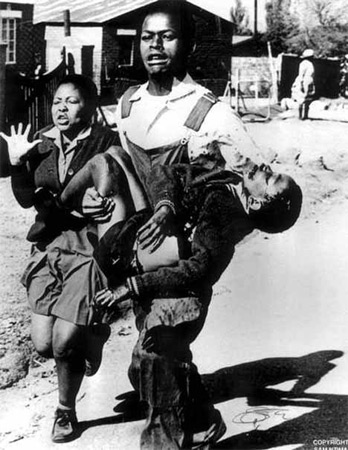
Sam Nzima with his famous photo of a dying Hector Pieterson being
carried by Mbuyisa Makhubo, while Hector’s sister Antoinette Sithole
runs alongside
The Soweto Uprisings were based on the National Party’s education policy which forced Black Africans to study Afrikaan in school as a medium of instruction, termed as Desmond Tutu as ” learning the language of the oppressors.”
On June 16th, 1976 thousands of students walked out of their schools to rally against the government. The peaceful protests turned violent as the South African police in an effort to quell the demonstration fired shots which led to students and organizers rioting.
The escalation ended with the police shooting dead anywhere between 200 to 600 people. The official government number was 23 fatalities. More impartial sources put the number at 500.
The Soweto Uprisings were a turning point in South Africa’s freedom struggle, establishing the primacy of the ANC’s role, internalizing a movement that hitherto had been fought outside of South Africa, primarily in Zimbabwe.
It also led the international community to exert pressure on the National Party to start reversing its apartheid policy which led to sporting and economic boycotts. Most importantly, it led the youth to unleash their power as catalysts towards the eventual goal of attaining freedom for their country. A generation of political activists were born during that time.
In 1994, Bafana Bafana were finally allowed back to the international sporting community after the PW Botha government finally renounced their apartheid policy. Today, they take on Uruguay on a historic day. Can they pull off a historic win?
Here is Lucille Davie and her recollection of the Soweto Uprisings >>
One comment on “June 16th is a special day in South African history”
The Soweto Uprisings were a turning point in South Africa’s freedom struggle,china travel establishing the primacy of the ANC’s role, internalizing a movement that hitherto had been fought outside of South Africa, primarily in Zimbabwe
china tours